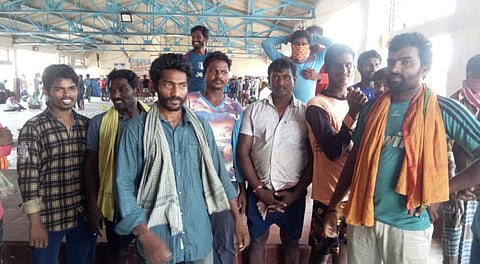

Did you know that over 98 per cent of the families dependent on fishing fall Below Poverty Line (BPL) in Srikakulam, Andhra Pradesh? Which is why most of them move to other states to find better opportunities.
A few days after about 5,000 fishermen from Srikakulam reached Veraval harbour in Gujarat the lockdown was announced to curb the spread of the Coronavirus. As the scare spread more and more, one fisherman stopped eating because he was worried he would catch Corona through food and three days after, he passed away from what was reported as a heart attack. Another fisherman heard that fishermen in neighbouring districts had tested positive for the virus and it stressed him out so much that he too had a heart attack and met his end. Then there was the fisherman who was stressed for his sister back in Srikakulam who was living alone because their parents had passed away.
Every fisherman had a story and each and everyone needed help. All they wanted to do was go home. You'll be happy to hear that they are on their way back, thanks to the efforts of fisher unions and groups that worked with the two state governments to make this happen. Many grassroots organisations, fisher trade unions and NGOs kept writing letters, putting in a word and basically working a lot in the backend to not only ensure that fishermen survive the ordeal, but also that the word got out about their state of being. One of the organisations who have been hard at work and making the most of their network to help in their own way is Dakshin Foundation.
Better together
Dakshin Foundation has worked with fisher families, fisher unions and other grassroots organisations that work for these families for social justice and securing the natural ecosystem. Their network spans many coastal states of India including Andaman and Lakshadweep. So when the lockdown was announced, their first action plan was to call everybody in their network to find out what the condition is on the ground. "Then we found out if local organisations are already helping them, if the local government is providing any relief measures and where our help would be useful," informs Marianne Manuel, Assistant Director at Dakshin Foundation. Since they couldn't be physically present, they took the help of National Fishworkers' Forum (NFF), several state boatowners' associations, officials from the local administrations and many other forums and associations working together to ensure that these groups were supported in the best way possible.
With all hands on deck, the members of the Bengaluru-based organisation were divided into teams and when they realised there were many fishermen stranded, they ensured that relief packages got to them through other organisations. "Most fishermen were stranded because the lockdown was announced overnight and they couldn't make arrangements to return home. In some areas, boats also arrived a few days into the lockdown," informs Marianne. coordination. So when they heard of a group in distress the team got to work alerting local administration of their problems or identifying a local NGO who could help. They continued to follow up with the group to make sure they had received the help needed and if not looked for other groups in the area who could help. They have also started a crowdfunding campaign to raise funds for partner organisations in Odisha and Tamil Nadu so that they can provide help to fisher families that required rations and health supplies urgently.
Root of all problems
Another sorry state of affairs came up when the foundation found out that fishermen were stuck in Mangaluru harbour and their living conditions left a lot to be desired. For instance, there were just two bathrooms at their disposal. The foundation has been following up with the concerned authorities to help them too. But why are we not hearing these stories? "Fishing communities, quite literally, live on the margins of the country. The sector also doesn’t get focussed attention at the Central level and was managed by the Ministry of Agriculture and Farmer’s Welfare until recently. Only in 2019 was the Ministry of Fisheries, Animal Husbandry and, Dairying created and even here fisheries is clearly not the exclusive focus," says Marianne. Talking about the lack of understanding of this industry, she says, "Even within the fisheries sector different groups are given more attention from the government. The role of women when it comes to fisheries has rarely received its due. Women play a critical role in post-harvest activities." While fish was listed as an essential commodity, it was only about two weeks into the lockdown that operations of the fishing industry was declared permissible and by then the damage had already been done.
All this is why, with the help of NFF and other organisations across the country, Dakshin is trying to bring stories from fisherwomen to the public. Videos of these fisherwomen sourced by Dakshin’s partners United Artists Association, Odisha and SNEHA, Nagapattinam are up on their Instagram page. Their fundraiser is to help these two grassroots organisations to procure kits for most vulnerable of the fisher families in these states, especially women-headed households or for those who don't have a ration card or no means to avail government schemes. "The fundraiser is for one crore. We have reached 10 per cent of our goal only at this point so we might extend the fundraiser to have enough time," informs Marianne. 3,300 families in Tamil Nadu and Odisha will receive these kits which would have supplies worth Rs 3,000.
Coming together and collaborating with other organisations has proven to be fruitful and it has been a highlight for them. And over the next few days, these groups will be focussing on trying to ensure that all migrant fishermen come back to their homes safe and sound and that fisher families are well provided for.
To know more about their campaign, check out milaap.org/fundraisers/support-dakshin-foundation-1
